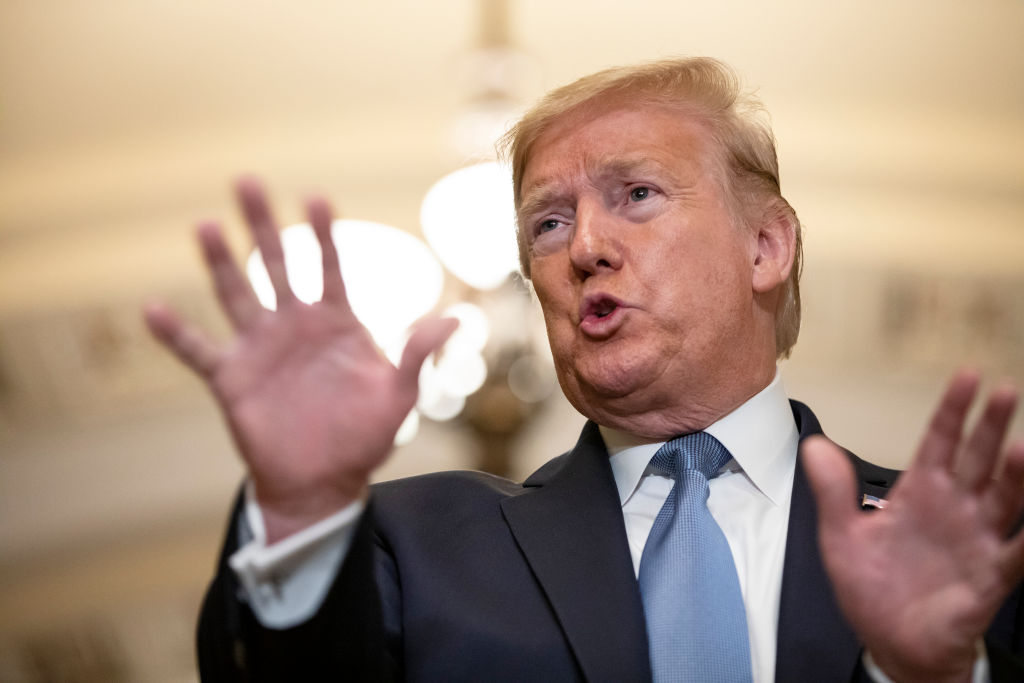
Both U.S. President Donald Trump and China’s Xi Jinping have good reasons to deflect political blame for the coronavirus outbreak. And that has both of them zeroing in on the pathogen’s name.
As the disease formally designated as COVID-19 expands across the U.S., Trump and other top Republicans have sought to highlight the outbreak’s foreign origin and even use it to justify curbs on immigration — including a wall on the southern border with Mexico. On Tuesday, Trump retweeted supporter Charlie Kirk calling it the “China virus,” with the president agreeing “we need the Wall more than ever!”
That’s a characterization that Beijing has been fighting since the virus was first discovered in humans in the central Chinese city of Wuhan in December. Chinese diplomats and state media have pushed back against terms like the “Wuhan flu” wherever they turn up, with Foreign Ministry spokesman Zhao Lijian arguing last week that “no conclusion has been reached yet on the origin of the virus.”
Read more: Don’t Blame China. The Next Pandemic Could Come from Anywhere
“By calling it ‘China virus’ and thus suggesting its origin without any supporting facts or evidence, some media clearly want China to take the blame and their ulterior motives are laid bare,” Zhao said.
The World Health Organization named the disease COVID-19 — short for “coronavirus disease 2019” — in part to avoid stigmatizing any one place or group for a virus that poses risks to everyone. Robert Redfield, the director of the U.S.’s Centers for Disease Control and Prevention, agreed that the term Chinese coronavirus was inappropriate when asked about Trump’s tweet at a congressional hearing Tuesday.
The term has caught on among some Republicans anxious about the political fallout, as financial markets endure their worst turmoil in a decade and Democrats assail the Trump administration’s early response on the campaign trail. Similarly, Xi’s Communist Party wants to suppress the phrase at home and abroad to minimize its own responsibility for a disease that has infected more than 118,000 people and threatens to push the global economy into recession.
The tense back-and-forth over what to call the virus is the latest chapter in a broader clash between the world’s two largest economies that ranges from trade and military competition to network equipment made by Huawei Technologies Co. It’s also a continuation of a diplomatic spat that began when the U.S. accused Beijing of delaying visits to China by American health experts, and risks hampering global efforts to combat the rapidly spreading outbreak.
Keep up to date with our daily coronavirus newsletter by clicking here.
“The geopolitical blame game is likely to be lose-lose for China and America,” said Rory Medcalf, a professor who heads the National Security College at the Australian National University. “This global health and economic crisis began with China’s suppression of truth domestically. But the world will lose an opportunity to cope with the dangers through honest cooperation, if both Washington and Beijing don’t move quickly now to focus on global solutions — not finger-pointing narratives.”
The debate intensified after U.S. Secretary of State Mike Pompeo complained during a March 6 Fox News interview that China wasn’t being transparent about what he called the “Wuhan virus.” Asked about the term, he said Chinese officials acknowledged that the disease began there: “Don’t take my word for it, take theirs. They’re right on this one.”
China’s foreign ministry hit back, denouncing Pompeo’s terminology as “despicable.”
“Despite the fact that the WHO has officially named this novel type of coronavirus, a certain American politician, disrespecting science and the WHO decision, jumped at the first chance to stigmatize China and Wuhan with it,” ministry spokesman Geng Shuang told a regular briefing on Monday. Asked again Wednesday, Geng said such rhetoric was “not conducive to a concerted international effort to combat the epidemic.”
In China, where most confirmed cases and deaths have occurred, Xi has been struggling to control the political narrative. He replaced top political leaders in Wuhan and the surrounding province of Hubei last month after a rare public outcry over the government’s response to the disease, which was first found in humans near a food market that sold wildlife.
The virus is also now dominating the U.S. political agenda, with former Vice President Joe Biden and Vermont Senator Bernie Sanders criticizing Trump’s handling of the outbreak and canceling their own events to avoid worsening it. Several Republican lawmakers, including Senator Ted Cruz of Texas, have quarantined themselves as a precaution after coming into contact with a person confirmed to have COVID-19.
House Minority Leader Kevin McCarthy, the chamber’s top Republican, defended a tweet describing the disease as the “Chinese coronavirus.” That led Representative Lois Frankel, of Florida, to press the CDC’s Redfield whether he would agree that such terminology was “absolutely wrong and inappropriate.”
“Yes,” Redfield said. “China was the first phase. Korea and Iran was the second phase, with Italy, now all of Europe.”
—With assistance from Dandan Li.
Please send any tips, leads, and stories to virus@time.com.
More Must-Reads from TIME
- Donald Trump Is TIME's 2024 Person of the Year
- Why We Chose Trump as Person of the Year
- Is Intermittent Fasting Good or Bad for You?
- The 100 Must-Read Books of 2024
- The 20 Best Christmas TV Episodes
- Column: If Optimism Feels Ridiculous Now, Try Hope
- The Future of Climate Action Is Trade Policy
- Merle Bombardieri Is Helping People Make the Baby Decision
Contact us at letters@time.com